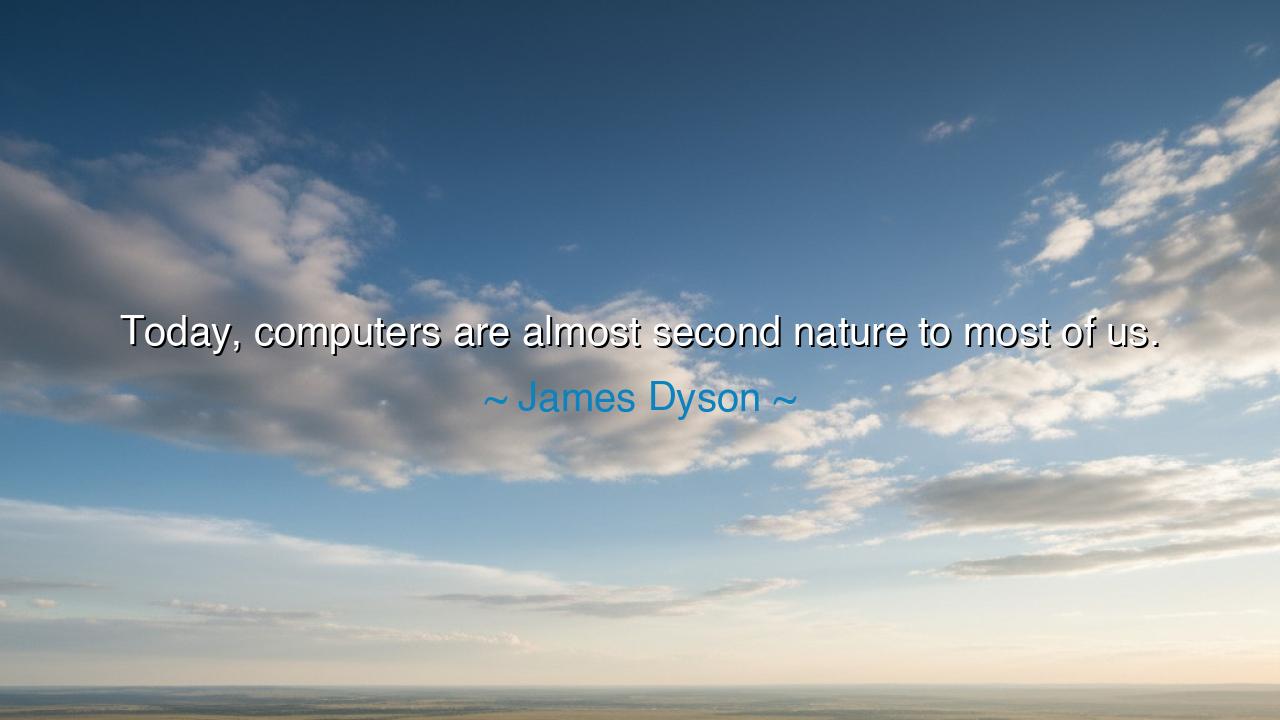
Today, computers are almost second nature to most of us.






“Today, computers are almost second nature to most of us.” — in these simple yet profound words, James Dyson, the visionary inventor, speaks not merely of technology, but of human adaptation. His statement marks a turning point in history — a moment when the creations of the human mind became extensions of the human body. To say that computers are now “second nature” is to acknowledge that they have become woven into the fabric of daily life, guiding our thoughts, our work, our memories, and even our dreams.
Dyson’s insight is rooted in observation, but it also carries the tone of marvel — and perhaps, quiet warning. Once, the computer was a tool: a machine built to calculate, to serve, to simplify. But through time, through the persistence of invention and dependence, it has become something more intimate — an invisible companion that shapes our habits, our reflexes, even our sense of self. To use a computer today is no longer a skill; it is a reflex, as natural as breathing, as unconscious as thought.
This transformation mirrors the great shifts of past ages. When fire was first harnessed, man learned to cook, to forge, to see through darkness — and in doing so, changed forever. When the wheel was invented, movement and distance were redefined. And now, with the computer, the human mind has found a new extension — a second nature that amplifies its reach beyond what was once imaginable. Dyson’s words thus remind us that every tool, once foreign, becomes familiar; every revolution of mind eventually seeps into instinct.
Consider the story of Alan Turing, the father of modern computing. In his time, the idea that a machine could think — could store, process, and evolve knowledge — was beyond comprehension for most. Yet his vision laid the foundation for the world Dyson describes. Turing’s dream was not merely of mechanical intelligence, but of partnership between man and machine. Decades later, that dream has matured into daily reality: our phones anticipate our words, our devices learn our preferences, our lives hum to the rhythm of algorithms. What was once the domain of genius has become the routine of the ordinary.
Yet Dyson’s statement carries another layer — one of subtle caution. For when a tool becomes second nature, we risk forgetting that it is a tool. The more natural the machine feels, the easier it is to surrender thought to its guidance. We must remember that computers reflect our strengths, but also our weaknesses. They mirror our creativity and our carelessness alike. To make them our second nature must not mean to make them our first master. Wisdom lies in remembering that what feels instinctive was once learned — and that mastery must be renewed, not assumed.
There is beauty, too, in Dyson’s reverence for this age. As an inventor, he sees computers not as threats, but as catalysts of imagination. The same digital precision that drives his vacuum designs also fuels the world’s art, science, and medicine. The human spirit, when paired with the digital tool, becomes a creator of miracles — designing prosthetics that move like living limbs, images that rival dreams, and machines that clean, heal, and build. To see computers as “second nature” is to recognize how deeply creativity and technology have merged, how invention has become an instinctual language of modern humanity.
The lesson of Dyson’s reflection is twofold: embrace technology, but remain its conscious wielder. Let computers serve your curiosity, not consume it. Use their precision to sharpen your vision, not dull your wonder. For the day we forget that our “second nature” was once an invention is the day we cease to invent anew.
So remember, O inheritor of the digital age — the computer is your mirror, not your maker. Let your first nature — your imagination, compassion, and will — guide your second. For as long as the heart leads the hand, even the machine will serve humanity’s highest purpose: not to replace thought, but to elevate it.






AAdministratorAdministrator
Welcome, honored guests. Please leave a comment, we will respond soon